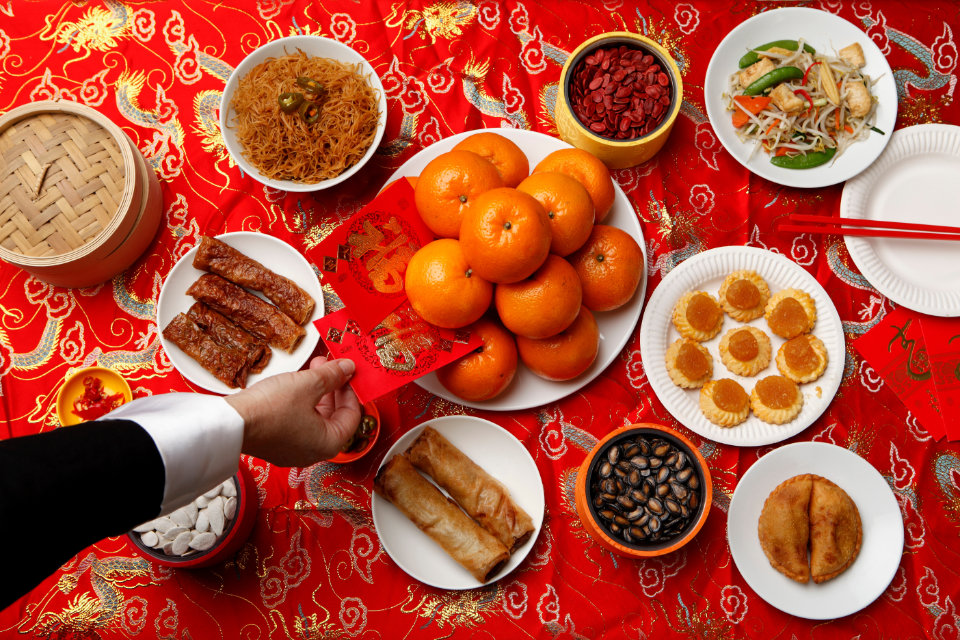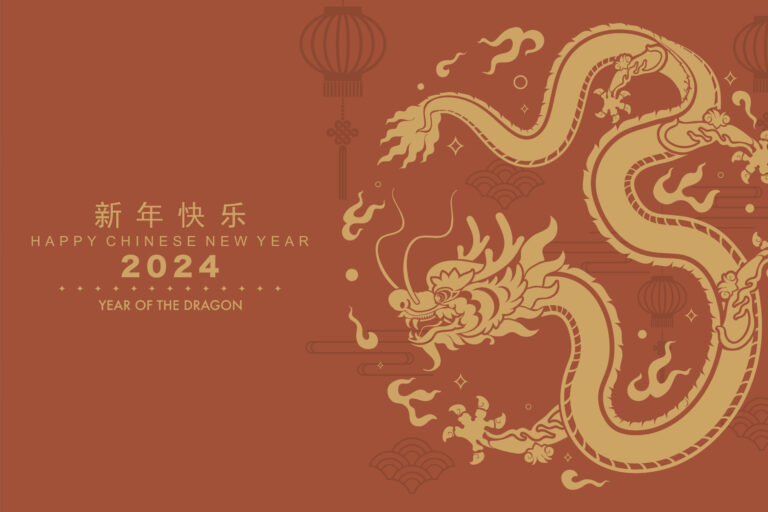The Chinese New Year, a festival steeped in history and rich cultural significance, marks a time of joyous celebration and reflection across the globe.
In 2024, this ancient festival, also known as the Spring Festival, will usher in the Year of the Wood Dragon, a year anticipated to be filled with strength, fortune, and dynamic transformations.
Let’s delves into the various facets of Chinese New Year 2024, from its astrological significance to modern-day celebrations.
Table of Contents
Unveiling the Chinese New Year 2024 Animal – The Wood Dragon
In the Chinese zodiac, the Dragon stands out as a symbol of power, nobility, and luck. The Wood Dragon, a combination that occurs every 60 years, brings a unique blend of ambitious energy and steady growth.
Characterized by its creativity and a powerful drive for success, the Wood Dragon’s influence in 2024 is expected to bring about significant developments and innovations.
The Dragon’s esteemed position in Chinese culture as a symbol of auspicious power further underscores the importance of the year 2024.
Is 2024 Lucky for You? – Chinese Horoscope 2024 for 12 Chinese Zodiac Animals
For each of the 12 Chinese zodiac animals, the year of the Wood Dragon holds varied prospects. From the ambitious Rat to the diligent Pig, each sign will experience the year differently. While Dragons might find 2024 to be particularly auspicious, Tigers might need to be cautious about their decisions.
These horoscopes, blending astrology with ancient wisdom, offer insights into career, health, and relationships for each animal sign in 2024.
| Rat Zodiac | Ox Zodiac | Tiger Zodiac | Rabbit Zodiac | Dragon Zodiac | Snake Zodiac |
| Horse Zodiac | Goat Zodiac | Monkey Zodiac | Rooster Zodiac | Dog Zodiac | Pig Zodiac |
Why Does Chinese New Year Date Change Every Year?
Unlike the Gregorian calendar, the Chinese calendar is lunisolar, relying on both lunar and solar movements to mark time. This means the Chinese New Year, which begins on the new moon closest to the beginning of spring, varies annually.
This variability, deeply rooted in astronomical observations and traditional lore, ensures that the festival aligns with the natural rhythms of the seasons.
How Long is the Chinese New Year Holiday?
The Chinese New Year 2024 holiday varies in length across different regions, reflecting diverse cultural practices and government policies. Here’s a closer look at the holiday duration in various places:
- China: The public holiday for the Lunar New Year in China spans 8 days, starting from Chinese New Year’s Eve to the sixth day of the lunar calendar new year. During this period:
- Offices, banks, factories, shops, and most non-essential services close for a week.
- Hotels and large retail outlets remain open, often experiencing increased business.
- Schools break for four weeks.
- Migrant workers often take extended leaves, traveling long distances to reunite with family.
- Taiwan: In 2024, Taiwan will observe a 7-day holiday from 8 February to 14 February, allowing residents to partake in traditional festivities and family gatherings.
- Hong Kong and Macau: Residents in these regions enjoy an 8-day holiday, which in 2024, will be from 10. February to 17 February, reflecting the importance of the festival in these culturally rich areas.
- Southeast Asian Countries: Countries such as Singapore, Malaysia, Indonesia, Thailand, and the Philippines typically have shorter holidays for Chinese New Year, ranging from 1 to 3 days. Despite the shorter duration, these countries often witness vibrant celebrations and community events.
These variations in holiday durations not only highlight the widespread influence of Chinese New Year but also illustrate how different regions adapt the celebration to their unique cultural and societal contexts.
How Long is Chinese New Year 2024?
The Chinese New Year, a festival marked by rich traditions and rituals, is celebrated over 16 days, commencing from Chinese New Year’s Eve to the Lantern Festival.
In 2024, this period includes significant dates such as Chinese New Year’s Eve on 9th February, Chinese New Year’s Day on February 10th, and the Lantern Festival on 24th February.
Each day of this festival has a specific name and purpose, reflecting the deep cultural significance of this period.
Below is a table outlining the important dates of the Lunar New Year 2024 and their meanings:
| Solar Date (2024) | Lunar Date | Title | Purpose / Meaning |
|---|---|---|---|
| Feb. 9th | 12th month, 30th day | 除夕 (Chúxì) | New Year’s Eve: Family reunion dinner and staying up until midnight. |
| Feb. 10th | 1st month, 1st day | 初一 (Chūyī) | New Year’s Day: Visiting and greeting family, giving presents, visiting ancestors’ graves. |
| Feb. 11th | 1st month, 2nd day | 初二 (Chū’èr) | In-Law’s Day: Married women visit their parents with their husbands and children. |
| Feb. 12th | 1st month, 3rd day | 初三 (Chūsān) | Day of the Rat: Staying at home, resting, and playing games with family. |
| Feb. 13th | 1st month, 4th day | 初四 (Chūsì) | Day of the Sheep: A day for prayer, offerings, or visiting temples and fortune-tellers. |
| Feb. 14th | 1st month, 5th day | 初五 (Chūwǔ) | Break Five: The day when previous taboos can be broken. |
| Feb. 15th | 1st month, 6th day | 初六 (Chūliù) | Day of the Horse: Ideal for discarding unwanted items and resuming labor. |
| Feb. 16th | 1st month, 7th day | 初七 (Chūqī) | Day of Mankind: Encouragement to spend time in nature, signifying the creation of humans. |
| Feb. 17th | 1st month, 8th day | 初八 (Chūbā) | Day of the Grain: Good weather symbolizes promising crops; families often have a second reunion dinner. |
| Feb. 18th | 1st month, 9th day | 初九 (Chūjiǔ) | Providence Health: Celebrating the Jade Emperor’s birthday with offerings, incense, and firecrackers. |
| Feb. 19th | 1st month, 10th day | 初十 (Chūshí) | Stone Festival: Honoring the ‘god stone’ with rituals similar to the previous day. |
| Feb. 20th | 1st month, 11th day | 初十一 (Chūshíyī) | Son-in-Law Day: Fathers ‘entertain’ or treat their sons-in-law. |
| Feb. 21st – 23th | 1st month, 12th – 14th day | 初十二 – 初十四 (Chūshí’èr – Chūshísì) | Lantern Day Preparations: Cooking, making lanterns, etc. for the upcoming Lantern Festival. |
| Feb. 24th | 1st month, 15th day | 初十五 (Chūshíwǔ) | Lantern Festival: The end of the festival, celebrated with lantern lighting, dragon dances, and lantern riddles. |
This detailed schedule of the Lunar New Year in 2024 provides a comprehensive understanding of the customs and traditions that define each day of this vibrant and culturally significant festival.
Chinese New Year Dates from 2024 to 2034
To help you plan for future celebrations, here’s a table outlining the Chinese New Year dates from 2024 to 2034, including the corresponding animal signs for each year:
| Year | Date of Chinese New Year | Chinese New Year Holiday | Animal Sign |
|---|---|---|---|
| 2024 | Saturday, Feb. 10 | Feb. 9-15 | Dragon |
| 2025 | Wednesday, Jan. 29 | Jan. 28 to Feb. 3 | Snake |
| 2026 | Tuesday, Feb. 17 | Feb. 16-22 | Horse |
| 2027 | Saturday, Feb. 6 | Feb. 5-11 | Goat |
| 2028 | Wednesday, Jan. 26 | Jan. 25-31 | Monkey |
| 2029 | Tuesday, Feb. 13 | Feb. 12-18 | Rooster |
| 2030 | Sunday, Feb. 3 | Feb. 2-8 | Dog |
| 2031 | Thursday, Jan. 23 | Jan. 22-28 | Pig |
| 2032 | Wednesday, Feb. 11 | Feb. 10-16 | Rat |
| 2033 | Monday, Jan. 31 | Jan. 30 to Feb 5 | Ox |
| 2034 | Sunday, Feb. 19 | Feb. 18-24 | Tiger |
This table provides a convenient reference for the dates and zodiac animals of Chinese New Year from 2024 to 2034, allowing you to anticipate and prepare for this significant cultural event well in advance.
Traditional Celebrations and Modern Observances
The celebration of the Chinese New Year, particularly in the Year of the Wood Dragon in 2024, showcases a blend of time-honored traditions and modern practices.
Central to these celebrations is the exchange of Happy Chinese New Year wishes and greetings, which have evolved with technology. Nowadays, these greetings are often shared digitally through social media and messaging platforms, allowing people worldwide to connect and convey their blessings and hopes for the new year.
Modern additions like city-wide light shows add a contemporary flair to traditional lantern displays, making the festival more accessible and visually spectacular.
These elements reflect the dynamic nature of the Wood Dragon, combining the traditional essence of family, renewal, and good fortune with modern innovations.
Culinary Delights of Chinese New Year
Food plays an integral role in the Chinese New Year celebrations, with each dish carrying its own unique symbolism and meaning.

These culinary traditions are deeply rooted in Chinese culture, offering more than just a treat for the palate – they’re a feast for the soul, encapsulating wishes for prosperity, health, and happiness in the new year.
Below is a table that highlights some of the traditional Chinese New Year foods and the reasons or meanings behind consuming them:
| Traditional Food | Chinese Name | Meaning/Reason for Eating |
|---|---|---|
| Dumplings (饺子) | Jiǎozi | Symbolize wealth and prosperity due to their shape resembling ancient Chinese money. |
| Spring Rolls (春卷) | Chūnjuǎn | Resemble gold bars, symbolizing wealth. |
| Glutinous Rice Cake (年糕) | Niángāo | Suggests growth or progress, symbolizing a higher income or position. |
| Sweet Rice Balls (汤圆) | Tāngyuán | Represent family togetherness and unity. |
| Fish (鱼) | Yú | Signifies surplus and prosperity; the Chinese word for fish sounds like ‘surplus’. |
| Longevity Noodles (长寿面) | Chángshòumiàn | Symbolize a long and healthy life due to their length. |
| Citrus Fruits | Represent wealth and luck; their round shape and golden color symbolize fullness and wealth. | |
| Whole Chicken | Embodies family unity and rebirth. | |
| Sweet Sticky Rice Balls (元宵) | Yuánxiāo | Consumed during the Lantern Festival, symbolizing family unity and togetherness. |
| Pineapple Tarts | 凤梨酥 (Fènglísū) | Symbolize prosperity and good luck, as ‘pineapple’ sounds like ‘prosperity’ in several Chinese dialects. |
| Beef Jerky (Rou Gan) | 肉干 (Ròugān) | Represents strength and vitality. |
| Yu Sheng | 鱼生 (Yúshēng) | A symbol of abundance and prosperity, traditionally enjoyed for its auspicious homophone for ‘abundance’. |
| Poon Choi | 盆菜 (Pén cài) | Represents a ‘basin of abundance’, symbolizing wealth and prosperity with its layers of ingredients. |
| Lion’s Head Meatballs | 狮子头 (Shīzitóu) | Signify power and strength, often eaten for good luck. |
| Shrimp | 虾 (Xiā) | Symbolize happiness and good fortune, as their Cantonese pronunciation is similar to laughter. |
| Steamed Pork Belly with Taro | 芋头扣肉 (Yùtóu kòuròu) | Represents wealth and prosperity due to the dish’s rich flavors and ingredients. |
Each of these dishes is not just a part of the feast but also a bearer of good wishes and hopes for Chinese New Year 2024.
The Enduring Spirit of Chinese New Year
Chinese New Year 2024, the Year of the Wood Dragon, presents a unique blend of tradition, cultural significance, and the promise of progress and prosperity.
Whether one is deeply rooted in Chinese heritage or simply fascinated by the rich tapestry of this cultural celebration, engaging in the festivities offers a chance to partake in a timeless tradition that continues to evolve and inspire.
What is the animal sign for Chinese New Year 2024?
The animal sign for Chinese New Year 2024 is the Wood Dragon.
When does the Chinese New Year 2024 start?
Chinese New Year 2024 starts on 10th February.
How long is the Chinese New Year 2024 celebration?
The celebration of Chinese New Year 2024 traditionally lasts for 16 days, from New Year’s Eve to the Lantern Festival.
What are typical foods eaten during Chinese New Year 2024?
Typical foods for Chinese New Year include dumplings, spring rolls, glutinous rice cake, and fish, each symbolizing prosperity, wealth, and good fortune.



